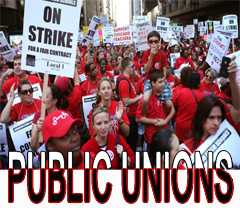 WASHINGTON, June 30 (Reuters) – The U.S. Supreme Court on Tuesday agreed to take up a case that could weaken public sector unions.
WASHINGTON, June 30 (Reuters) – The U.S. Supreme Court on Tuesday agreed to take up a case that could weaken public sector unions.
This is a huge problem not only for unions but for the Democratic Party. As industrial union employment has plummeted, the unions have turned to the public sector for worker support. Teachers, ferry workers, cops .. all are organized across the US. To a large extent the dues paid by these workers support unions and through the unions, the Democratic Party.
The argument against public sector unions is very similar to the argument behind the right to work, anti union laws in states like South Carolina … with two exceptions. 1. Government has no intrinsic interest in attracting workers from other states. 2. Strikes by public sector workers are far more disruptive to the public than a traditional strike against even a large employer.
The challenge taken up by SCOTUS comes from 10 non-union public school teachers who say California’s requirement that they pay the equivalent of union dues violates their free speech rights. This is interesting because the teachers unions only organize public school teachers. So far the AFT and NEA have avoided organizing private schools. Presumably this is because a strike against a Private school would have a tiny impact as compared to shutting down a public school system.
The result, however, is that private school teachers have greater freedom of speech as they do not pay dues. The dissident teachers have asked the court to upend a decades-old practice that lets public-sector unions collect money from workers who do not want union representation so long as the money is not spent on political activities. Of course the “not spent on political activities” is a wink-wink as unions readily found other ways of expressing their political will. READMORE
When Congress passed the Taft-Hartley Act in 1947, it provided that employees could opt out of compulsory union membership by paying “shop fees.” These fees are based on the premise that non-union workers in a union shop benefit economically from the bargaining services provided by the union, and therefore should help pay for these services so they aren’t “free riders.” A secondary issue is whether unions, which have fiduciary duties to their members, can be required to provide services beyond bargaining, such as representation in grievances, to non-dues-paying non-members, as this would seem to constitute a taking of private property without compensation. In the larger scheme of things, unions are the mainstay of the Democratic Party, both for financial support and manpower for election campaigns, and destroying unions is a top priority of the Republican Party because to do so would seriously undermine the Democratic Party. The GOP, like many of its business supporters, doesn’t believe in competition; its goal is to eliminate competition.
Did the authors of the Act consider public unions and PACs?